GEORGE BENSON/AL JARREAU / “Tutu”
The legendary Miles Davis recorded most of his most influential and most memorable music on the Columbia record label. Miles’ Columbia catalogue is so deep that Columbia is still packaging previously unreleased recordings. There is no hint that Columbia will dredge up a masterwork like Kind of Blue or Bitches Brew, nevertheless much of the newly issued material is first rate music from a master.
Miles had been with Columbia for decades, so it was a shock when it was announced that Miles Davis was moving to Warner Bros. Most of us expected that move to mean that Miles was not going to ever again play hardcore jazz. Tutu, Miles’ first Warner Bros. release, seem to both confirm our worse fears and, paradoxically, to offer hope that Miles would produce more great music.
Miles found a new Gil Evans in Marcus Miller. On Tutu, in addition to producing, Miller played all of the instruments other than trumpet and also wrote most of the music. Tutu proved to be a hit and became emblematic of the new music Miles was making.
Here was a truly funky fusion music, much more funk-oriented and less rock-oriented than had been most of Miles’ previous electric work. Moreover, the follow-up to Tutu was Siesta, which sounded like a second cousin to the Miles Davis/Gil Evans Sketches of Spain masterwork collaboration from decades earlier.
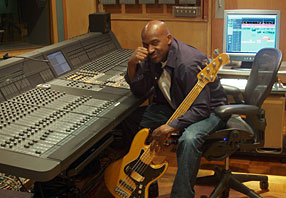 In many, many important ways Marcus Miller was the heart of the new Miles Davis sound. So even though “Tutu” is indelibly associated with Miles, “Tutu” is actually Marcus Miller all the way. Here we have five versions and as blasphemous as it may sound, Miles’ version is the least interesting to me.
In many, many important ways Marcus Miller was the heart of the new Miles Davis sound. So even though “Tutu” is indelibly associated with Miles, “Tutu” is actually Marcus Miller all the way. Here we have five versions and as blasphemous as it may sound, Miles’ version is the least interesting to me.
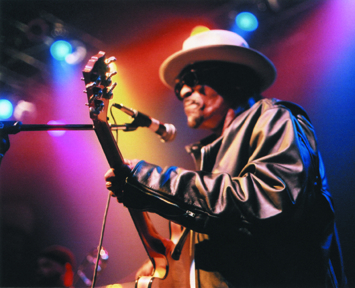 We open this handful of versions with a quintessential Go-Go treatment from Chuck Brown, the Godfather of Go-Go. It’s a live recording that perfectly captures the infectious, drum-driven Washington DC regional rhythm. In fact, they are well-over two minutes into the song before the identifiable bass riff is sounded, not to mention playing the melodic theme, which doesn’t happen until after the three minute mark. The delays in stating the theme notwithstanding, this is a truly funky take on a theme that was already immersed in funk.
Another interesting twist is the trumpet solo, which owes more to Dizzy Gillespie’s influence than to Miles. I wonder what Miles would have thought of this version.
We open this handful of versions with a quintessential Go-Go treatment from Chuck Brown, the Godfather of Go-Go. It’s a live recording that perfectly captures the infectious, drum-driven Washington DC regional rhythm. In fact, they are well-over two minutes into the song before the identifiable bass riff is sounded, not to mention playing the melodic theme, which doesn’t happen until after the three minute mark. The delays in stating the theme notwithstanding, this is a truly funky take on a theme that was already immersed in funk.
Another interesting twist is the trumpet solo, which owes more to Dizzy Gillespie’s influence than to Miles. I wonder what Miles would have thought of this version.
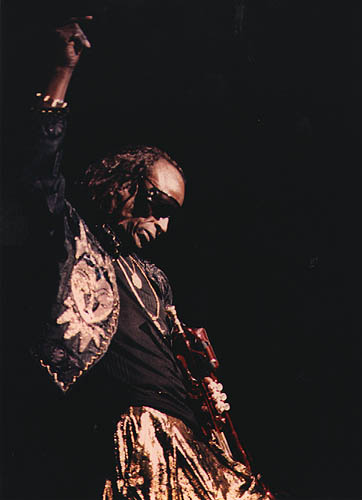 Next is the Miles version from the Tutu album. Listen to the production; Miles is almost a sideman on his own album. Miller’s bass is more upfront than Miles’ trumpet. The keys are thickly layered and all kinds of percussion touches flow through the song along with voices deep in the mix. In many ways the production overshadows the lead instrument. Plus, the trumpet solo is not very memorable, certainly not as memorable as the thematic hook.
Next is the Miles version from the Tutu album. Listen to the production; Miles is almost a sideman on his own album. Miller’s bass is more upfront than Miles’ trumpet. The keys are thickly layered and all kinds of percussion touches flow through the song along with voices deep in the mix. In many ways the production overshadows the lead instrument. Plus, the trumpet solo is not very memorable, certainly not as memorable as the thematic hook.
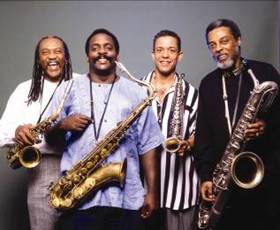 And now for the most incongruous of all the versions—first off, it’s from Selim Sivad: A Tribute to Miles Davis. Is it me or does anyone else find it rather odd that a saxophone quartet is doing a tribute to a trumpet player! Of course, it’s not any generic saxophone quartet. This is The World Saxophone Quartet, the premiere ensemble of its type. Add to the instrumental incongruity, the quartet (David Murray – tenor, Hamiet Bluiett – baritone, Oliver Lake – alto, John Purcell – saxello) is here joined by a brace of drummers (Chief Bey, Okyerema Asante, Titos Sompa) and the featured solo is by trap drummer Jack DeJohnette. It doesn’t get any odder. Were it not for DeJohnette, there is no way this version would have made the cut musically. Plus, the engineering is abysmal. It sounds like this was recorded with tin cans rather than modern microphones.
And now for the most incongruous of all the versions—first off, it’s from Selim Sivad: A Tribute to Miles Davis. Is it me or does anyone else find it rather odd that a saxophone quartet is doing a tribute to a trumpet player! Of course, it’s not any generic saxophone quartet. This is The World Saxophone Quartet, the premiere ensemble of its type. Add to the instrumental incongruity, the quartet (David Murray – tenor, Hamiet Bluiett – baritone, Oliver Lake – alto, John Purcell – saxello) is here joined by a brace of drummers (Chief Bey, Okyerema Asante, Titos Sompa) and the featured solo is by trap drummer Jack DeJohnette. It doesn’t get any odder. Were it not for DeJohnette, there is no way this version would have made the cut musically. Plus, the engineering is abysmal. It sounds like this was recorded with tin cans rather than modern microphones.
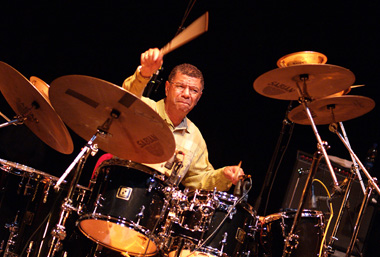 All quibbles and disagreements aside however, Jack Dejohnette does a masterful drum solo that perfectly illustrates how a great jazz drummer can handle up on a song, make the drums sing. Dejohnette’s solo is so thoroughly in the pocket, you can hum the theme along with him. The horn solos are OK, but this is a case where you’ve got to do a little bit more than give the drummer some. He takes the whole cake. Also, this version casts “Tutu” as a jazz number with African percussion poly-rhythms. The heavy funk backbeat recedes into the percussive background.
The feature cut is next. It’s from Dreyfus Night In Paris, an all-star, one-off concert that had all the makings of being a by-the-numbers, wham bam, boisterous but forgettable affair. These cats are pros and they all rise to the occasion to lay down an impressive fusion of jazz and funk. It starts out tentatively, almost like the band wasn’t sure of what the song was going to be, but then Miller comes in booming the bass riff and everybody falls into step.
All quibbles and disagreements aside however, Jack Dejohnette does a masterful drum solo that perfectly illustrates how a great jazz drummer can handle up on a song, make the drums sing. Dejohnette’s solo is so thoroughly in the pocket, you can hum the theme along with him. The horn solos are OK, but this is a case where you’ve got to do a little bit more than give the drummer some. He takes the whole cake. Also, this version casts “Tutu” as a jazz number with African percussion poly-rhythms. The heavy funk backbeat recedes into the percussive background.
The feature cut is next. It’s from Dreyfus Night In Paris, an all-star, one-off concert that had all the makings of being a by-the-numbers, wham bam, boisterous but forgettable affair. These cats are pros and they all rise to the occasion to lay down an impressive fusion of jazz and funk. It starts out tentatively, almost like the band wasn’t sure of what the song was going to be, but then Miller comes in booming the bass riff and everybody falls into step.
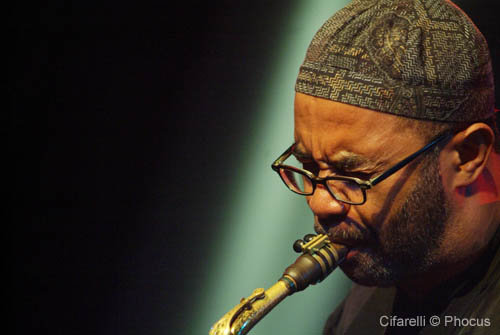 Miles’ last great saxophonist, Kenny Garrett, solos first. My man does his preaching thing, almost like Maceo on steroids, and receives a warm ovation. I was really curious, where would they go from a solo that sounded like a finale?
Miles’ last great saxophonist, Kenny Garrett, solos first. My man does his preaching thing, almost like Maceo on steroids, and receives a warm ovation. I was really curious, where would they go from a solo that sounded like a finale?
 Gypsy jazz guitarist Bireli Lagrene follows Garrett and delivers a very impressive solo that is both passionate in its emotional impact and intelligent in its over all design. It’s a great, great introduction to this man’s work for those who are unfamiliar with Lagrene’s work.
Gypsy jazz guitarist Bireli Lagrene follows Garrett and delivers a very impressive solo that is both passionate in its emotional impact and intelligent in its over all design. It’s a great, great introduction to this man’s work for those who are unfamiliar with Lagrene’s work.
 Michel Petrucciani is the biggest surprise. I have heard a good bit of his work but this is his funkiest offering yet. Petrucciani displays a knowledge of the Ramsey Lewis school of two-handed funk piano, at the same time, however, Petrucciani does not sound like a clone or a mere imitator. He really digs in deep.
Michel Petrucciani is the biggest surprise. I have heard a good bit of his work but this is his funkiest offering yet. Petrucciani displays a knowledge of the Ramsey Lewis school of two-handed funk piano, at the same time, however, Petrucciani does not sound like a clone or a mere imitator. He really digs in deep.
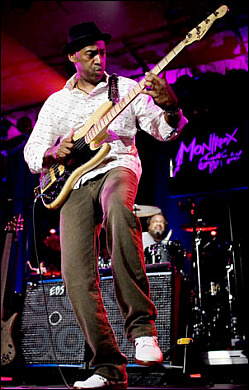 Marcus Miller is the last and shortest soloist. The first part of his brief solo sounds like a conventional electric jazz guitarist doing a journeyman job, but when Miller turns the corner, he drops the jazz stroll and dips with a hip dance on the good foot. Bootsy Collins or Larry Graham couldn’t have whacked and thumped any harder than Miller does. What is really notable is that Miller resists the temptation to grandstand and showboat even as he pulls off an awe-inspiring feat of worrying a high note while playing the familiar bass riff on the top strings. And just when you’re all ears to fully enjoy the commotion, Miller drops back into the theme.
Marcus Miller is the last and shortest soloist. The first part of his brief solo sounds like a conventional electric jazz guitarist doing a journeyman job, but when Miller turns the corner, he drops the jazz stroll and dips with a hip dance on the good foot. Bootsy Collins or Larry Graham couldn’t have whacked and thumped any harder than Miller does. What is really notable is that Miller resists the temptation to grandstand and showboat even as he pulls off an awe-inspiring feat of worrying a high note while playing the familiar bass riff on the top strings. And just when you’re all ears to fully enjoy the commotion, Miller drops back into the theme.
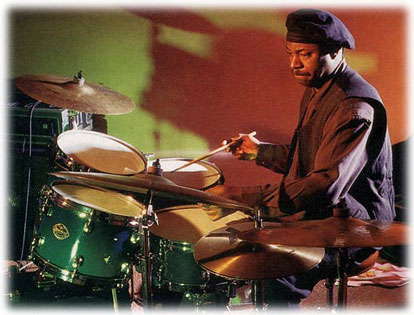 Drummer Lenny White doesn’t solo but he is so, so important to the feel-so-good atmosphere that "Tutu" drops on us. Where he could have just banged away on the back beat, White choose to use deft cymbal work that adds color and texture. It’s a jazz drummer’s way of adding to the heaviness of the music by using light touches. All in all, this version of “Tutu” lives up to its billing and offers stellar music from an all-star aggregation.
Drummer Lenny White doesn’t solo but he is so, so important to the feel-so-good atmosphere that "Tutu" drops on us. Where he could have just banged away on the back beat, White choose to use deft cymbal work that adds color and texture. It’s a jazz drummer’s way of adding to the heaviness of the music by using light touches. All in all, this version of “Tutu” lives up to its billing and offers stellar music from an all-star aggregation.
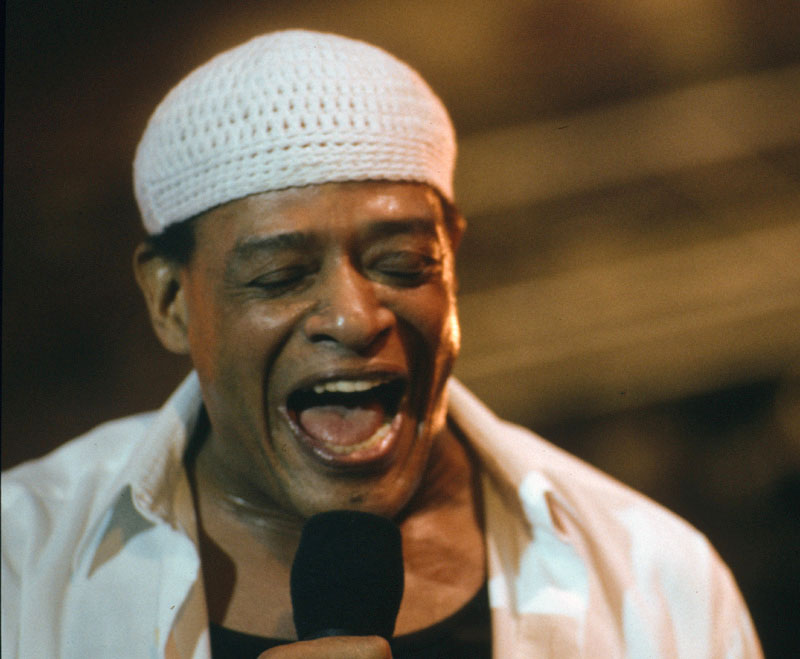 The last version features Al Jarreau and George Benson. It’s really a toss up between the Dreyfus version and this one from the duo’s new album. Jarreau is his usual jovial self, exuding all kinds of joy and happiness, but Benson goes a step beyond with a beautiful guitar solo that displays far more of Benson’s jazz chops than most of his “smooth jazz” recordings offer.
The last version features Al Jarreau and George Benson. It’s really a toss up between the Dreyfus version and this one from the duo’s new album. Jarreau is his usual jovial self, exuding all kinds of joy and happiness, but Benson goes a step beyond with a beautiful guitar solo that displays far more of Benson’s jazz chops than most of his “smooth jazz” recordings offer.
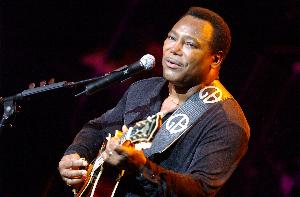
 Finally, I don't know what's wrong with me (really, I do know—it's been a long week, averaging 4.5./5 hours of sleep and running on fumes), but anyway, I forgot to include Cassandra Wilson's version. You know I've got to include Cassandra. And Mtume, you probably have a comment you want to make about her version. Sorry about not letting you know and dropping this on you after we've gone up for the week.
—Kalamu ya Salaam
Finally, I don't know what's wrong with me (really, I do know—it's been a long week, averaging 4.5./5 hours of sleep and running on fumes), but anyway, I forgot to include Cassandra Wilson's version. You know I've got to include Cassandra. And Mtume, you probably have a comment you want to make about her version. Sorry about not letting you know and dropping this on you after we've gone up for the week.
—Kalamu ya Salaam
This entry was posted on Sunday, March 11th, 2007 at 2:59 am and is filed under Cover. You can follow any responses to this entry through the RSS 2.0 feed. You can leave a response, or trackback from your own site.
3 Responses to “GEORGE BENSON/AL JARREAU / “Tutu””
March 11th, 2007 at 4:45 pm
Ok, Okay, wonder if we could get something going here, who can rock the bass better Marcus Miller or Stanley Clarke although both give mad props to Larry Graham for the thumping and popping. Yeah we know Marcus was Luther’s best friend and played on every Luther record and had complete control of Miles "Tutu" album (although one song was produced by George Duke), but I think Stanley ranks right up there with Marcus. But one has to wonder if Marcus can play straight ahead jazz with the string bass like Stanley can (Teena Marie’s "Cassanova Brown")? A toss-up!!!!
Kalamu Sez
Definitely Stanley Clarke is the better bass player, however, as a producer and all-around multi-instrumentalist session man, I’d have to go with Marcus Miller. In fact we have some Stanley Clarke in the lineup, can’t say when it will drop but it’s in the wings waiting its turn.
Kalamu
March 13th, 2007 at 12:43 pm
I think Stanley may be technically more proficient, but Marcus in my opinion is the better all around musician.
Leave a Reply
| top |